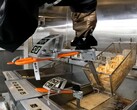NBC4 news in Los Angeles reported that Venhub convenience stores in Southern California, operated entirely by robots, have lowered building and operating costs by 31% compared to traditional human-staffed stores.
Venhub operates without requiring breaks or staff changes, utilizing two proprietary AI robotic arms that ride on a long metal track to fill customer orders 24/7. The robots use AI vision recognition to identify products. Swappable suction cups and grabber hands allow the robots to handle a variety of products.
The store can stock over 400 product SKUs and comes with six smart refrigerated cabinets. Owners can remotely track all inventory, operations, and sales with live surveillance monitoring. Predictive AI inventory and demand trends optimize restocking.
The unit costs approximately $250,000 to $275,000 and is fully owner owned. The robots require a monthly SaaS fee of $2,500 and optional $1,300 servicing and preventative maintenance fee (about $5.21 per hour total during 24/7 operations).
This eliminates the difficulty of finding and holding on to employees when the minimum hourly wage is now $20 for fast food workers and $16.50 for non-fast food workers in California. Customers benefit from lower prices. One customer found Coke selling for $0.79, which normally sells for more than $2 at other convenience stores.
Venhub stores feature a secure design that keeps customers outside, deterring criminal break-ins and preventing mass mob thefts that plague local convenience stores. This also helps keep the products and store cleaner, particularly during pandemics. Customers pay using smartphones, so there is no cash to steal. Customers use window boxes to pick up orders, and all windows are bulletproof.
Power is provided by the utility, while backup batteries keep the store operational during outages and natural disasters. A future update will add solar power and frozen food support. The building measures 22 x 10 x 10 feet (6.71 x 3.05 x 3.05 m) and requires a lot with 4 feet (1.22 m) of access on all sides.
Interested convenience store operators can order a Venhub here. Readers wanting to learn more about the market can read this book on automated stores and this book on the history of 7-Eleven.





















